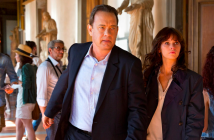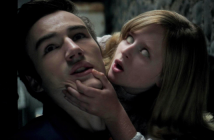
Cast: Tadeusz Bradecki, Zofia Mrozowska, Malgorzata Zajaczkowska
Director: Krzysztof Zanussi
Country: Poland
Genre: Drama
Editor’s Notes: The following review is part of our coverage for Martin Scorsese Presents: Masterpieces of Polish Cinema which runs from February 5th to 16th. For more information on this film series visit filmlinc.com and follow The Film Society of Lincoln Center on Twitter @FilmLinc.
There are many things on display in Krzysztof Zanussi’s 1980 film The Constant Factor. It covers as much ground as confronting greed and corruption in the Polish workforce to youthful idealism to coping with the death of parents and the slow erosion of hope in the face of hopelessness.
The story centers on Witold (Tadeusz Bradecki), a 22 year old man who skips university after his military service in favor of working for a company as an electrician to save up money for university and for an expedition to the Himalayas. His father was a mountain climber who died there when Witold was only twelve and he wants to make the ascent himself either as a tribute to his father or to show that he can do what his father could not. He makes decent money and even gets to travel abroad to India and one other country (it isn’t said where, just ‘in the west’). He has a flair and love of mathematics and keeps promising his mother that he is thinking of going to university to pursue it, though he seems unwilling to take that step.
….the film can be seen as one man’s idealistic struggle against the overwhelming powers of greed and corruption and how the system beats him down at every turn eventually taking his mother, job and future away from him because he wants to speak out against it.
When his mother becomes ill, Witold passes up an opportunity to go to the U. S. on a job so he can stay with her. When he sees she is not getting the proper care in the hospital, he tries to bribe a doctor to get her the care she needs but he is so bad at corruption of any kind that he botches it miserably. This catches the attention of a young nurse (Malgorzata Zajackowasa) who tries to help him in getting it right and they develop a tenuous relationship.
When his mother dies, he returns to work and Warsaw a broken and empty man. He sees no point in a lot of things and seeks to find meaning by fighting the open corruption in his workplace. He refuses to go in with a coworker who notices a projector is not invoiced and therefore will not be missed. They could sell it and make some extra money with no one even noticing, but Witold loudly protests and even brings it up to the boss, who doesn’t understand the objection. He then puts up a big stink about being told to take a cheaper hotel room so he can pocket the difference from the hotel stipend. This all puts him on the outs with his coworkers and his boss.

He tries to take his case to higher-ups, but that fizzles out because they’re just as corrupt as everyone else. When he finally gets his chance to go on the expedition to the Himalayas, he is detained and arrested due to a frame-up by his vindictive coworkers. He ends up a window washer for his trouble, unable to go on his expedition and unable to follow out his passion for mathematics.
In Witold, writer/director Zanussi makes some pretty severe criticisms of communist Poland, but also about the folly of youth. On one hand, the film can be seen as one man’s idealistic struggle against the overwhelming powers of greed and corruption and how the system beats him down at every turn eventually taking his mother, job and future away from him because he wants to speak out against it. On the other hand, it can be viewed as the errant ways of youthful simplicity. If Witold doesn’t like the corruption, he doesn’t have to take part in it, his boss says this much, but it is Witold’s persistence and belief that if he says something, everything will change. If he’d kept his mouth shut but kept his principles by not participating, he may have been able to get by and keep his job and eventually fulfill his dreams. His stubbornness ends up costing him everything except his relationship with the nurse.
Zanussi’s decisions as director really help to propel this somewhat thin story into great meaning and understanding. He doesn’t do anything flashy; in fact most of his shots are static. He holds onto scenes a bit longer so emphasize Witold’s awkwardness in nearly every situation. By holding onto these scenes, he lets Bradecki go through his emotions and fill in the spaces with unease. Witold really doesn’t seem to know how to function in this world at all and stumbles around without ever fully appreciating the magnitude of the struggle he has chosen to take on.
While visually Zanussi does a lot of work to show the stifling nature of Witold’s situation, in his script he takes it to a heavy-handed extreme.
Zanussi does break from these static long scenes occasionally by showing helicopter shots of the Himalayas. This feels like Witold’s imagination taking him to a better place where things are simpler. They represent a yearning for freedom and an escape from the immorality that surrounds him on a daily basis. To have that dream thwarted by vindictive coworkers is a crushing blow to Witold, but one that he at least says he can bounce back from, possibly because of his mountain climbing background. He may have slipped, but he feels his pitons are secure and all he needs is a good foothold and something to pull up on.
While visually Zanussi does a lot of work to show the stifling nature of Witold’s situation, in his script he takes it to a heavy-handed extreme. He goes to a lot of trouble to have Witold speak out in front of a lot of people in an effort to get them on his side and has the other characters berate him (at one point even attack him) telling him that he’s wrong. Instead of letting the system play out as it does in an informal hearing of the higher-ups of the company and having that be the largest expression of corruption winning, Zanussi chooses to have nearly every character try to talk Witold out of taking on this cause because corruption is just the way of their reality. His dialogue and some scenes almost seek to undermine the visual style that he’s created to alienate Witold. We’re shown that he’s basically alone, but then we’re repeatedly told that as well.
The Constant Factor still packs a punch, even if the script seeks to dull the pain of it. The struggle of Witold feels real and we feel his frustration, possibly even more than he does. He holds onto his hope long after it should have been dashed by circumstance and for that the film should be commended. Zanussi created a character that stands firm if for no other reason because he feels he’s doing the right thing even when everyone around him is telling him to give up. It’s Witold’s strength and willingness to scale a nearly insurmountable mountain that carries the film forward, despite the message bludgeoning Zanussi inflicts on us.
[notification type=”star”]85/100 ~ GREAT. The Constant Factor still packs a punch, even if the script seeks to dull the pain of it. The struggle of Witold feels real and we feel his frustration, possibly even more than he does. [/notification]



